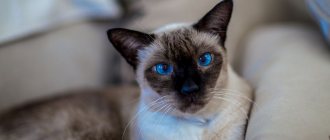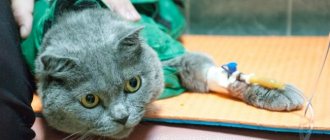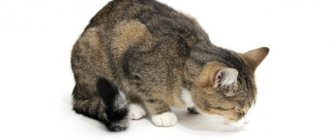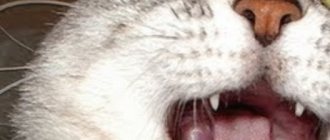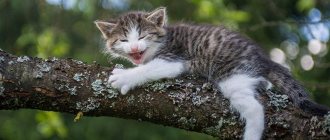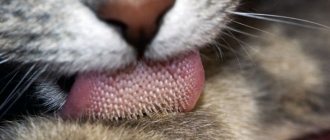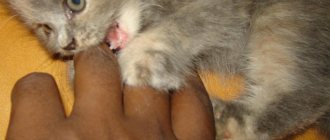7791Administration
2
Having got a pet for the first time, the owner often notices that the cat meows in its sleep. This can cause concern as the owner usually begins to consider this an abnormality. In reality, in the overwhelming majority of cases, the animal does not need help, since voicing is just a response to dreams, the interpretation of the content of which from the animal’s reaction, unfortunately, is impossible. However, in rare cases, meowing can be a signal of discomfort.
Spayed cat or neutered cat
Experience shows that a sterilized cat screams in the apartment at night from lack of attention. In this way, she requires the owner's love, so before you decide to have a pet, weigh the pros and cons again. A cat, even a sterilized one, needs a lot of time. It is not enough to just feed her and sometimes pet her - you need to play with her, communicate with her, pet her, and entertain her. Nature has arranged it in such a way that both animals and humans experience acute melancholy from loneliness and lack of love at night or at dawn.
As for castrated cats, they most often scream in the apartment at night for completely different reasons - they may not only be lonely, but also scared. Your pet can experience anxiety for any reason. In order for him to stop meowing and screaming, it is usually enough to pet him. In addition, cats behave restlessly during weather changes. Their behavior can indicate heavy rain, snowfall, hurricane winds and even an earthquake. Never ignore seemingly unreasonable anxiety in your pets.
What causes seizures?
A cat twitches convulsively in its sleep due to the presence of an internal disease or a pathological process caused by parasites. The most common causes of seizures are:
- tumors;
- lymph inflammation;
- brain diseases;
- mental pathologies;
- deficiency of calcium or other substances;
- disturbances in the functions of the peripheral nervous system;
- infection by parasites and others.
When figuring out why cats twitch in their sleep, doctors identify specific diseases, including:
- non-purulent meningoencephalitis;
- cerebral ischemic encephalopathy;
- viral infectious peritonitis;
- toxoplasmosis;
- hyperparathyroidism;
- helminthiasis;
- ticks and fleas;
- excess medications or other drugs and additives in the blood;
- microstroke;
- lack of vitamin B;
- urolithiasis disease;
- renal failure;
- anemia.
Each of these diseases is very serious, but the most dangerous of them are meningoencephalitis, encephalopia and peritonitis.
Causes of night meowing
If you start to figure out why a cat meows at night for no reason, it becomes clear that she still has a reason to do this. It could be:
- a riot of hormones, which is regularly observed in unsterilized cats and uncastrated cats;
- acute pain that our pets may experience, for example, due to an intestinal disorder, or exacerbation of chronic diseases, for example, urolithiasis;
- intestinal parasites, whose vital activity is activated at night, which causes serious discomfort and causes severe anxiety in pets;
- attracting the attention of the owners in order to demand something forbidden from them - permission to sleep on the bed or some kind of delicacy, in a word - manipulation;
- feeling of anxiety - cats have the ability to anticipate certain events that may threaten their serene life, for example, the arrival of guests;
- battle for territory - pets show restlessness at night when moving to a new place or even spending the night in another room;
- sadness and melancholy, characteristic of little kittens who were separated from their mother and taken to a new home for further residence.
Quite often, old cats and cats that are more than 10-15 years old begin to meow at night. It's hard to believe, but it turns out that elderly pets, just like people, can suffer from Alzheimer's disease, which manifests itself in increased restlessness at night. Unfortunately, it is impossible to cure this disease, but you need to try to smooth out its manifestations as much as possible, providing your old and sick pet with maximum attention during the day.
When should you worry?
If a cat's paws twitch in its sleep, this is not always a cause for alarm. You should keep an eye on your pet. You need to observe not so much in a dream as at the moment of awakening. The state of the animal is immediately visible: if the cat is happy, she has the perky look of a hooligan or, on the contrary, the mysterious arrogant look of an empress, she stretches and yawns, purrs briefly and abruptly.
You should be concerned if your cat twitches too often during sleep. When your pet looks unhappy, tired and lethargic when waking up, you should immediately contact a veterinarian.
Doctors' help is also required in cases where a cat twitches its paws in its sleep and then wakes up sweaty and with wet fur. This is a symptom of internal problems in the body, which may be related to hormonal balance or kidney function.
Persians who eat dry food often suffer from kidney failure and urolithiasis. Persian cats prone to such ailments always first begin to twitch and sweat, and only after some time do characteristic symptoms appear - changes in the concentration, color and smell of urine.
When observing a sleeping twitching cat, you need to carefully touch it, trying not to wake the pet. This should be done in order to understand whether the animal has a spasm - contraction of muscle fibers. It is impossible to determine this visually. If your pet's body or legs are cramping, you should immediately consult a doctor.
What to do and how to calm an animal meowing at night?
Above, we figured out why a cat yells for no reason at night, and now let’s talk about how to calm an agitated animal. Experienced breeders recommend:
- provide the animal with active games during the day, using toys for these purposes, both purchased in pet stores and made independently from scrap materials;
- in the evening, shortly before bedtime, feed the cat with meat delicacies - protein-rich food will help the animal begin to fall asleep, thanks to it the cat will not get hungry until the morning and will not wake up its owner.
If, despite the measures taken, the cat still continues to scream at night, then it’s time to show him to the veterinarian. A professional examination will let you know if your pet needs treatment or if it needs to be wormed to stop the nightly concerts.
Why does a healthy cat sniffle in its sleep?
For the same reason as a person. Just like us, cats have sleep cycles.
During the slow (low-wave, shallow) phase, the cat's muscles tense, breathing and pulse slow down. Metabolism, blood pressure and body temperature decrease. Such a dream is very sensitive, and you can notice how the cat reacts to all sounds by moving its ears.
The fast phase (deep) occurs on average twenty minutes after the slow one. The pulse and breathing become uneven, and the cat will no longer be able to wake up easily and quickly. The sleep here is deeper. It is in this cycle that you can hear snoring and snoring from your pet.
Cats are more likely to wheeze or snore when they sleep in an odd position. Also, due to shortened nasal passages and an elongated palate, some cat breeds, usually brachiocephalic (for example, Persian, British or Scottish breeds), sniffle.
What not to do?
A cat regularly yelling and meowing at night can infuriate even a calm, balanced and patient owner, but no matter how much you want to pick up a broom and teach your pet a lesson, stop - violent measures will only aggravate the existing problem, the animal will be offended and begin to take revenge . An angry cat is capable of a lot - the following can join the night concerts:
- wet slippers;
- torn wallpaper;
- furniture torn by claws, etc.
If a completely healthy animal continues to wake up your family at night with its meows, use sedatives that can be bought at a veterinary pharmacy, but do not abuse them.
It can be quite difficult for a person and a cat to get along in the same territory, but if you decide to adopt a furry pet into your family, then be prepared for the fact that it will bring you a lot of trouble. Night concerts are extremely rarely organized by healthy and happy animals. Find out the reason for the cat's unusual behavior at night!
See also: the cat continues to scream after mating
How much money will need to be spent on all these manipulations?
The amount will be different in different regions. On average, preparatory tests will cost the animal owner from 1000 to 2000 rubles. In addition, sterilizing a cat will cost you 5,000 rubles, if you castrate a cat, the price will be about 3,000 rubles.
So, it is already clear that castration or sterilization is not a simple operation. When we take a pet into our home, we take on a huge responsibility. So what can happen after the operation, what consequences can the owner expect?
Most pets spend the entire day alone and lack affection and attention. With a cry, the cat asks to be played with, stroked, and given time.
A cat moans in a dream, what could it be?
Noticing that a cat is twitching in its sleep, the owner may be concerned about the well-being of the pet. If we are talking about an adult cat, suspicions are far from unfounded. Let's figure out why cats twitch in their sleep and what it may indicate if a cat twitches too much.Do cats dream?
It was cats, or rather, their dreams, that made it possible to prove to the whole world that animals also plunge into the world of dreams. Moreover, scientists suggest that our pets' dreams are much richer and more dynamic than ours. It all started when doctors began to study the phases of human sleep. To confirm their assumption that healthy people lose the ability to move during REM sleep, an experiment was conducted on a group of cats.
All animals had a small area of the brain removed, which was responsible for muscle atonia in the REM phase of sleep. After the animals were fully rehabilitated, the scientists' suspicions were corrected. The observed cats stood on their paws, walked confidently, and turned their heads, as if watching someone. While in a state of sleep, cats sniffed and turned their ears. The experiment proved that cats see, hear and touch dreams.
This is interesting! A healthy, adult animal does not move during REM sleep, although rapid eye movements and slight twitching are considered normal.
With the development of medical equipment, it was possible to prove that during dreams, cats experience real emotions: fear, joy, excitement, aggression. Near the animals under observation, “pheromones” of a same-sex cat were sprayed and the observed one showed aggression. In the opposite case, when the scent of an animal of the opposite sex was sprayed, the observed behaved calmly or interestedly. That is, animals not paralyzed by the REM phase not only sensed the outside world, but also made natural, instinctive decisions. These observations led to the conclusion that in their dreams, cats see themselves and their surroundings very realistically.
This is interesting! Experiments were carried out on cats, dogs and rodents. Cats surprised scientists by very naturally emitting hunting in their dreams. The dogs unexpectedly hinted at the animal essence, imitating the behavior of wild wolves. The rodents broke all records, because even in their sleep they were able to solve the tasks assigned to them.
The study of human and animal sleep continues. Of course, today it is no longer practiced to remove part of the brain for the sake of observation. To relieve atonia during the REM phase, blockades of part of the brain are used. Modern scientists are on the verge of a big discovery, since the experiments included observations of brain activity using highly sensitive scanners. There is no doubt that cats dream, but perhaps we will soon find out exactly what their dream world looks like. Already today, scientists have managed to find out that kittens see their first dreams while still in the womb.
A kitten's active sleep is not a reason to worry
Most of the speculation surrounding the concern comes from kitten owners. We dare to assure you that if your cat twitches in his sleep, but he is not yet 12-15 months old, this is normal. Don't worry if the kitten sleeps in an unnatural position or if its eyes are slightly open. The first is explained by the fact that kittens are not so demanding of comfort, the second is due to the presence of a third eyelid, a transparent film that protects the eye during sleep, even if it is open.
The kitten may twitch violently, roll over, and even meow after stress or active play. If the baby is sleeping and you notice that his paws are twitching, it means that the four-legged animal is walking or running in its sleep. Until 1.5–2 years of age, activity in the REM phase is absolutely normal and is explained by an incompletely formed nervous system.
The REM phase of sleep in kittens up to 6 months takes up about 80% of all sleep time. If you notice that your cat doesn’t startle in its sleep as often as before, you can draw conclusions about the strengthening of the nervous system and the maturation of the animal as a whole. The period of formation of the nervous system is very individual and depends on many factors. In outbred so-called native cats, it lasts up to 10 months; some purebred cats “remain children” for up to two years.
When are there reasons for concern?
The owner should worry, and it is better to immediately consult a doctor if twitching during sleep resembles convulsions. If you have the slightest doubt, wake up your pet and observe how quickly he wakes up. A healthy cat, even if in a completely relaxed state, will fully wake up within 10-15 seconds. If the half-asleep state seems suspicious to you, you observe that the cat has difficulty breathing, raising its head or swallowing saliva - call a doctor.
If you cannot wake up your pet or he loses consciousness, call a doctor immediately, as the seizure is likely to recur. After a severe seizure (depending on its cause), the cat may lose consciousness and never regain consciousness. Seizures are a very serious condition and indicate that the brain is unable to control the central nervous system.
Important! Videos periodically appear on the Internet of how a sleeping cat suddenly jumps up and runs, can crash into obstacles, etc. It may look funny, but this behavior indicates severe disturbances in the functioning of the central nervous system.
A separate risk group is pregnant and recently given birth cats. Immediately after giving birth, when the cat is resting, a seizure may indicate postpartum preeclampsia - a very dangerous condition that will lead to the death of the pet if emergency care is not provided. Constant, increasing trembling, turning into convulsions, is a sign of hypoglycemia, which quickly develops into a coma and is fraught with the death of the cat.
A seizure or violent twitching can be explained by a number of events that are not related to illness. After severe stress or fright, moving, a fight, or experiencing danger, a cat is likely to twitch in its sleep - this is not entirely normal, but no special measures need to be taken. Decreased control of the central nervous system indicates that the cat's brain and neural connections are temporarily "mothballed." Everything will return to normal when the pet’s body recovers. If the cat was not stressed and looked healthy all day, you need to rule out:
- Contact with carriers of the virus in the last 10-14 days - some diseases develop very quickly, but most of them behave secretly during the incubation period. Please note that the virus can be brought into your home on clothing or shoes, which means that all unvaccinated animals are at risk. Seizures usually develop against a background of high fever.
- Heatstroke and hypothermia - both conditions lead to disruption of metabolic processes in the cat's body and can be accompanied by seizures.
- Dehydration - usually develops against a background of prolonged vomiting or diarrhea. If a cat does not drink water or does not drink enough fluids, chronic dehydration may occur, which sooner or later will lead to serious metabolic disorders, oxygen deprivation and seizures.
